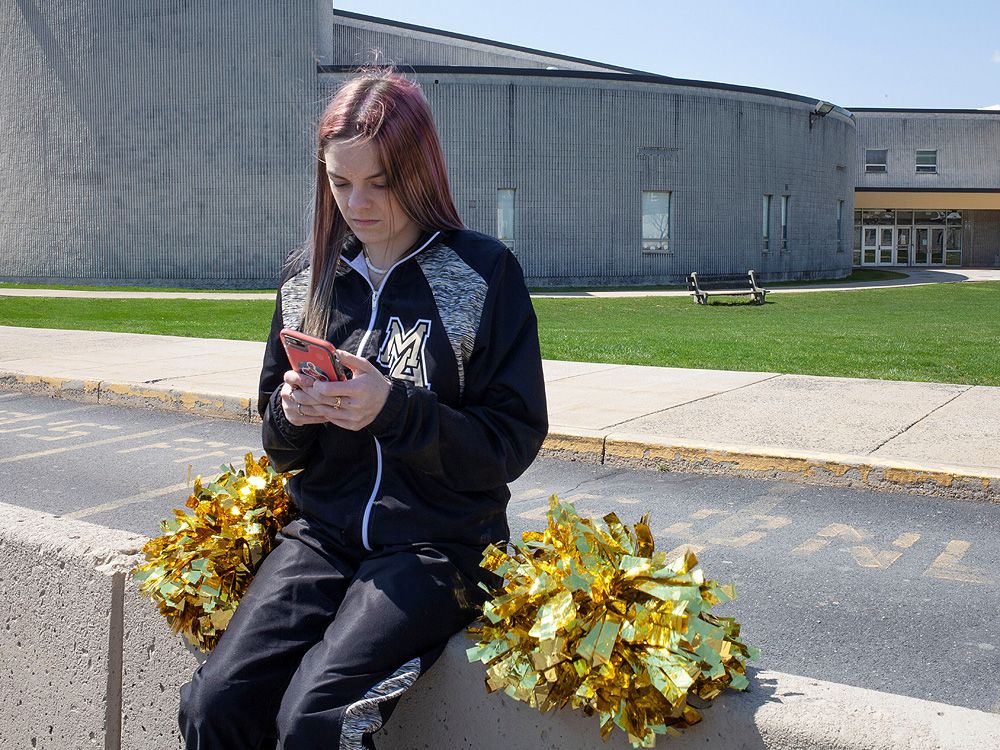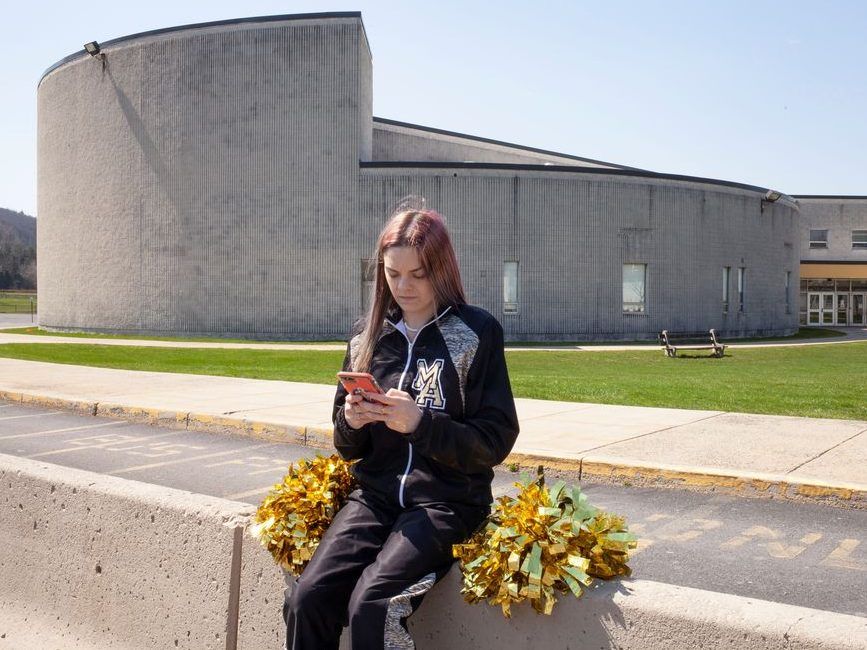Cheerleader's Snapchat profanity gets U.S. Supreme Court's attention
Author of the article:Reuters
Reuters
Andrew Chung
Publishing date:Apr 23, 2021 • 11 hours ago • 4 minute read • 9 Comments
Brandi Levy, a former cheerleader at Mahanoy Area High School in Mahanoy City, Pennsylvania and a key figure in a major U.S. case about free speech, poses in an undated photograph provided by the American Civil Liberties Union.
Brandi Levy, a former cheerleader at Mahanoy Area High School in Mahanoy City, Pennsylvania and a key figure in a major U.S. case about free speech, poses in an undated photograph provided by the American Civil Liberties Union. PHOTO BY DANNA SINGER /Handout via REUTERS
Article content
Two days after Mahanoy Area High School in Pennsylvania held its cheerleading tryouts, ninth-grader Brandi Levy was still fuming about being passed over for a spot on the varsity squad.
While a younger girl had been picked for varsity, Levy was facing another year relegated to the junior varsity cheer squad. That Saturday afternoon in May 2017 – standing not on school grounds but in the Cocoa Hut convenience store in Mahanoy City in the state’s coal country – Levy pulled out her cellphone and, along with a friend, raised her middle finger to the camera.
Prince Harry reportedly met with Queen Elizabeth 'at least twice' in England
Trackerdslogo
Levy, age 14 at the time, posted the photo to the Snapchat social media platform, adding a caption using the same curse word four times to voice her displeasure with cheerleading, softball, school and “everything.”
That posting prompted the school to banish her from the cheerleading squad for a year. It also led to a major U.S. Supreme Court case testing the limits of one of America’s bedrock constitutional rights. The nine justices on Wednesday are due to hear arguments on whether this disciplinary act by a public school – a government institution – violated the U.S. Constitution’s First Amendment guarantee of freedom of speech.
Advertisement
STORY CONTINUES BELOW
This advertisement has not loaded yet, but your article continues below.
Article content
For Levy, now 18 and a college student studying accounting, the punishment at the time felt instinctively wrong.
“I was thinking through my head that was unfair, like how could I be punished for something so small? And I didn’t do it in school, so I was questioning why,” Levy said in an interview.
“I shouldn’t have to be afraid to express myself and I should be able to do it how I want to without being punished by anybody. What I said, it wasn’t targeting, it wasn’t bullying, harassment, or anything like that,” Levy added.
Backed by the American Civil Liberties Union, Levy and her parents sued the Mahanoy Area School District seeking reinstatement to the squad and a judgment that her First Amendment rights had been violated.
The Philadelphia-based 3rd U.S. Circuit Court of Appeals sided with Levy, finding that the First Amendment bars public school officials from regulating off-campus speech. The district then appealed to the Supreme Court.
Under a 1969 Supreme Court precedent, public schools may punish student speech that would “substantially disrupt” the school community. Levy’s case will determine whether this authority extends beyond the schoolhouse gates.
The Supreme Court is due to rule by the end of June.
A decision in favor of Levy, according to the district and its supporters, could make it harder for teachers and administrators to curb bullying, racism, cheating and invasions of privacy, all frequently occurring online, outside school property or during off hours.
Advertisement
STORY CONTINUES BELOW
This advertisement has not loaded yet, but your article continues below.
Article content
President Joe Biden’s administration supports the district, arguing that off-campus student speech deserves broad protection unless it threatens the school community or targets specific individuals, groups or school functions.
“Principals have to ensure the safety and well being of everybody on their campus,” said Ronn Nozoe, chief executive officer of the National Association of Secondary School Principals. “It can’t be the Wild West.”
The district has argued that off-campus student speech can harm a school and its functions, noting that in the internet era the lines between on-campus and off-campus are blurred.
“If a student on the weekend uses her private email to blast harassing messages to school email accounts, where did the speech happen?” the district asked in a legal filing.
Levy’s photo was visible for 24 hours on Snapchat, along with another post questioning the younger girl’s selection. Some cheerleaders and students chafed at the posts and the controversy disrupted classes, according to court papers. The cheerleading coaches removed Levy from the team, saying she had broken various rules and undermined team cohesion.
After she sued, a judge ordered Levy’s reinstatement to the squad, finding that her actions had not been disruptive enough to warrant the punishment. The 3rd Circuit went further, deciding that the Supreme Court’s 1969 precedent, known as Tinker v. Des Moines Independent Community School District, does not apply to off-campus speech and school officials may not regulate such speech.
Advertisement
STORY CONTINUES BELOW
This advertisement has not loaded yet, but your article continues below.
Article content
The ACLU said giving educators the power to police off-campus speech would extend censorship everywhere young people go and prompt schools to conduct “dragnet online surveillance” of students.
“There’s lots of things that schools can do to protect students from bullying and harassment that doesn’t involve punishing kids for speech that they engage in off campus,” said Sara Rose, an attorney at the ACLU of Pennsylvania who is involved in the case.
The religious-liberty group Alliance Defending Freedom told the justices in a brief to guard against fueling “cancel culture,” a term used by conservatives to criticize the pushback against public figures deemed to have said or done something deemed offensive by others.

 torontosun.com
torontosun.com
Author of the article:Reuters
Reuters
Andrew Chung
Publishing date:Apr 23, 2021 • 11 hours ago • 4 minute read • 9 Comments
Brandi Levy, a former cheerleader at Mahanoy Area High School in Mahanoy City, Pennsylvania and a key figure in a major U.S. case about free speech, poses in an undated photograph provided by the American Civil Liberties Union.
Brandi Levy, a former cheerleader at Mahanoy Area High School in Mahanoy City, Pennsylvania and a key figure in a major U.S. case about free speech, poses in an undated photograph provided by the American Civil Liberties Union. PHOTO BY DANNA SINGER /Handout via REUTERS
Article content
Two days after Mahanoy Area High School in Pennsylvania held its cheerleading tryouts, ninth-grader Brandi Levy was still fuming about being passed over for a spot on the varsity squad.
While a younger girl had been picked for varsity, Levy was facing another year relegated to the junior varsity cheer squad. That Saturday afternoon in May 2017 – standing not on school grounds but in the Cocoa Hut convenience store in Mahanoy City in the state’s coal country – Levy pulled out her cellphone and, along with a friend, raised her middle finger to the camera.
Prince Harry reportedly met with Queen Elizabeth 'at least twice' in England
Trackerdslogo
Levy, age 14 at the time, posted the photo to the Snapchat social media platform, adding a caption using the same curse word four times to voice her displeasure with cheerleading, softball, school and “everything.”
That posting prompted the school to banish her from the cheerleading squad for a year. It also led to a major U.S. Supreme Court case testing the limits of one of America’s bedrock constitutional rights. The nine justices on Wednesday are due to hear arguments on whether this disciplinary act by a public school – a government institution – violated the U.S. Constitution’s First Amendment guarantee of freedom of speech.
Advertisement
STORY CONTINUES BELOW
This advertisement has not loaded yet, but your article continues below.
Article content
For Levy, now 18 and a college student studying accounting, the punishment at the time felt instinctively wrong.
“I was thinking through my head that was unfair, like how could I be punished for something so small? And I didn’t do it in school, so I was questioning why,” Levy said in an interview.
“I shouldn’t have to be afraid to express myself and I should be able to do it how I want to without being punished by anybody. What I said, it wasn’t targeting, it wasn’t bullying, harassment, or anything like that,” Levy added.
Backed by the American Civil Liberties Union, Levy and her parents sued the Mahanoy Area School District seeking reinstatement to the squad and a judgment that her First Amendment rights had been violated.
The Philadelphia-based 3rd U.S. Circuit Court of Appeals sided with Levy, finding that the First Amendment bars public school officials from regulating off-campus speech. The district then appealed to the Supreme Court.
Under a 1969 Supreme Court precedent, public schools may punish student speech that would “substantially disrupt” the school community. Levy’s case will determine whether this authority extends beyond the schoolhouse gates.
The Supreme Court is due to rule by the end of June.
A decision in favor of Levy, according to the district and its supporters, could make it harder for teachers and administrators to curb bullying, racism, cheating and invasions of privacy, all frequently occurring online, outside school property or during off hours.
Advertisement
STORY CONTINUES BELOW
This advertisement has not loaded yet, but your article continues below.
Article content
President Joe Biden’s administration supports the district, arguing that off-campus student speech deserves broad protection unless it threatens the school community or targets specific individuals, groups or school functions.
“Principals have to ensure the safety and well being of everybody on their campus,” said Ronn Nozoe, chief executive officer of the National Association of Secondary School Principals. “It can’t be the Wild West.”
The district has argued that off-campus student speech can harm a school and its functions, noting that in the internet era the lines between on-campus and off-campus are blurred.
“If a student on the weekend uses her private email to blast harassing messages to school email accounts, where did the speech happen?” the district asked in a legal filing.
Levy’s photo was visible for 24 hours on Snapchat, along with another post questioning the younger girl’s selection. Some cheerleaders and students chafed at the posts and the controversy disrupted classes, according to court papers. The cheerleading coaches removed Levy from the team, saying she had broken various rules and undermined team cohesion.
After she sued, a judge ordered Levy’s reinstatement to the squad, finding that her actions had not been disruptive enough to warrant the punishment. The 3rd Circuit went further, deciding that the Supreme Court’s 1969 precedent, known as Tinker v. Des Moines Independent Community School District, does not apply to off-campus speech and school officials may not regulate such speech.
Advertisement
STORY CONTINUES BELOW
This advertisement has not loaded yet, but your article continues below.
Article content
The ACLU said giving educators the power to police off-campus speech would extend censorship everywhere young people go and prompt schools to conduct “dragnet online surveillance” of students.
“There’s lots of things that schools can do to protect students from bullying and harassment that doesn’t involve punishing kids for speech that they engage in off campus,” said Sara Rose, an attorney at the ACLU of Pennsylvania who is involved in the case.
The religious-liberty group Alliance Defending Freedom told the justices in a brief to guard against fueling “cancel culture,” a term used by conservatives to criticize the pushback against public figures deemed to have said or done something deemed offensive by others.

Cheerleader's Snapchat profanity gets U.S. Supreme Court's attention
Two days after Mahanoy Area High School in Pennsylvania held its cheerleading tryouts, ninth-grader Brandi Levy was still fuming about being passed over for a spot …
